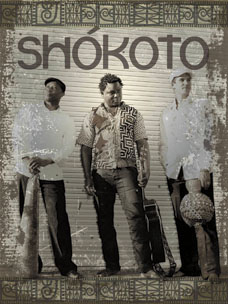 His music incorporates the essential elements and spirit of West Africa and influences from the cultures of the African Diaspora.
His music incorporates the essential elements and spirit of West Africa and influences from the cultures of the African Diaspora.
Okaidja hopes to preserve traditional African music and dance and to promote cross-cultural understanding by sharing his culture with diverse groups of people. He creates music and dance programs that are educational, innovative and entertaining.
Okaidja has worked extensively throughout America’s rural towns, spreading his culture to people in very homogenous parts of the United States. The small towns that he visits are extremely touched and enriched by his unique presence. Many of the children in rural schools have never touched a drum before or sang a song in a different language. It is an awesome opportunity for him to bring Africa into their schools, homes, and hearts, profoundly impacting their worldview.
He has also done tremendous work in connecting the music and dance forms of the African Diaspora back to their roots in Africa. For the past several years he has been studying the origins of African Diaspora arts and tracing them back to the Gold Coase of Africa. Through his studies, he has created a unique form of music and dance that blends traditional Ghanaian music and dance with rhythms and movements of the African Diaspora, including Afro-Cuban, Afro-Brazilian, Afro-Peruvian, American Blues, Jazz and Tap.
Okaidja was born in 1975 into a family of singers and songwriters in Ghana. Okaidja’s mother, Atsiawa Kodjo, was a colorful lead singer in the spiritual church she attended. As a young boy Okaidja sang in churches and while he worked as a canoe boy on fishing boats on the weekends. Out on the fishing boats, the fishermen would sing a cappella songs as they worked and Okaidja passed the long days learning the songs of the great Naaye (sea).
At 19 Okaidja was accepted as a professional musician and dancer for the prestigious Ghana Dance Ensemble at the University of Ghana’s Institute of African Studies. He became well known for his energetic stage presence and excelled in his performances of the Ga fetish songs and dances. The Ghana Dance Ensemble gave Okaidja the opportunity to study with the best teachers in the country such as the late Emeritus Professor A.M. Opoku. Upon his return from the 1997 U.S tour with the Ensemble, Okaidja was invited to teach Ghanaian drumming and dance workshops in Germany.
At the same time, the legendary Obo Addy was looking for fresh, young talent to bring to his group in Portland, Oregon. One day after a grueling rehearsal with the Ensemble, Okaidja walked out of the auditorium and was met by Obo Addy. The two made an instant connection and soon Okaidja was packing his bags to move to the USA to work with Obo’s group, Okropong. Okaidja served as a principal dancer and gave memorable performances with Okropong at major festivals and performance venues such as the Kennedy Center, the Newmark Theater and the WOMAD Festival.
In 2005 Okaidja recorded his first solo album, The Traditionalist., which Okaidja’s interpretation of the folkloric songs he grew up singing. The listener is able to experience the rawness and emotions that he feels as he sings about his homeland. He followed with a second album, Obutu Apla where he ventures away from the strictly traditional. Songs on this album highlight Okaidja’s impressive vocal abilities through his passion-filled lyrics that tell stories about love and life. It contains elements of Afro-Cuban, Afro-Brazilian, Afro-Peruvian, and Blues music.
The discoveries he made prompted him to form Shókoto Music & Dance Project.
{jcomments on}

